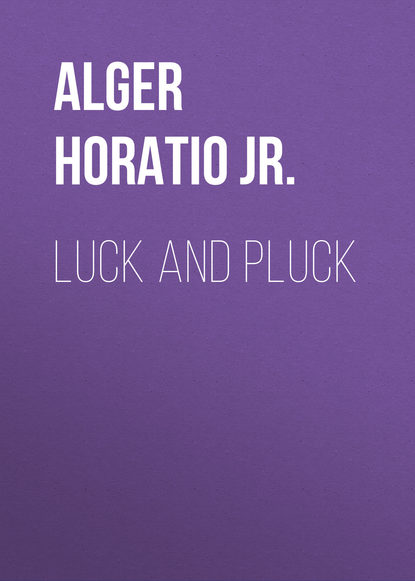По всем вопросам обращайтесь на: info@litportal.ru
(©) 2003-2025.
✖
Luck and Pluck
Настройки чтения
Размер шрифта
Высота строк
Поля
"Then I should think it very strange."
"You are at liberty to think it very strange," said Mrs. Oakley, composedly.
"Why should you object to telling me that he went away with your brother, Mr. Huxter, and is now at his house?"
Mrs. Oakley started in surprise. The lawyer was better informed than she supposed.
"If you knew," she answered, after a slight pause, "why need you inquire?"
"I wished to know whether you had sent him away, intending to keep his destination a secret."
"I suppose he has written to you."
"He did write to me; but the letter was suppressed by your brother. May I inquire whether this was by your wish?"
"What you tell me is news to me," said Mrs. Oakley; "but I have no hesitation in saying that my brother understands my wishes, and will carry them out."
"I am answered," said the lawyer. "Is it your intention to permit John to continue his studies preparatory for college?"
"It is not."
"It was his father's wish and intention. That wish ought to be sacred with you."
"I understand my duty."
"I trust you will do something more than understand it," said the lawyer, gravely. "I must remonstrate with you on your intentions with regard to John. He is an excellent scholar, and his abilities are superior. It would be a great pity that he should be debarred from the privilege of a college education."
"You say he is an excellent scholar," said Mrs. Oakley. "Then, if his education is already so excellent, there is no further need of his studying. He can begin to earn his living."
"Surely you do not mean what you say. If he were poor, and such a necessity existed, it would be well enough that he should go to work; but you well know that no such necessity exists."
"I am not going to support him in idleness," said Mrs. Oakley, coolly.
"As a student in college he would lead far from an idle life," said the lawyer. "Study is hard work, and college distinction is never won by a lazy student."
"It may be work, though to my mind it is not; but it brings in no money."
"Not at first, perhaps, but it prepares the student for remunerative employment in after life."
"I don't think much of colleges."
Though Mrs. Oakley said this, she would have been very glad to have Ben in college, not that she cared so much to have him a scholar, but it would give him a good social standing.
"I don't know," said Squire Selwyn, rather sharply, for he was getting out of patience with Mrs. Oakley,—"I don't know that it matters much what your opinion of colleges is. It was, as you know, the desire and intention of your late husband that John should enter college. It is your moral duty to carry out that intention."
"I don't care to be told what is my duty," said Mrs. Oakley, her eyes flashing.
"Do you propose to be independent of public opinion?"
"Perhaps you mean your opinion?"
"Not mine alone. Let me tell you, Mrs. Oakley, that in defrauding John Oakley of the privileges which his father meant him to enjoy, you are wronging the dead as well as the living,—not John alone, but the dead husband from whom all your money comes."
"He chose to leave all his money to me," said Mrs. Oakley, "Probably he thought that I would know how to dispose of it without outside advice."
"I am not so sure that he did leave his money to you," said the lawyer, significantly.
Mrs. Oakley flushed. Could he know that the will was found? Involuntarily she put her hand to her pocket, where the will was at that moment lying concealed. But a moment's reflection satisfied her that Hannah, who had not left the house, could not have had a communication with Squire Selwyn. Besides, there was no probability of Hannah's suspecting the nature of the document which she had seen in the candle.
"You have not forgotten that there was a will executed three months before Mr. Oakley died," added Squire Selwyn,—"a will by which John would have come into possession of two-thirds of the estate."
"I have heard a great deal about that will," retorted Mrs. Oakley. "Undoubtedly my husband destroyed it, as unjust to me."
"I don't see how it was unjust to you. It left the property as the law would have left it."
"Very well, where is the will? If you will produce it, I shall of course surrender to John all except the third which comes to me."
"I wish I could produce it."
"But you can't," said Mrs. Oakley, triumphantly, looking the lawyer in the face.
"In my opinion it has never been properly searched for," said the lawyer. "I have the strongest reason to believe that it exists."
"May I inquire what is that reason?" asked Mrs. Oakley.
"Mr. Oakley, in his last sickness, spoke to John about the will."
"What did he say about it?" asked the lady. "This is the first I have heard of it."
"Unfortunately he was so low that he was unable to declare where it was."
Mrs. Oakley looked relieved.
"But John heard the words 'secret drawer.'"
"Then you conclude that the will is still in existence."
"I do."
"And where do you think it is?"
"Somewhere in this house," said Squire Selwyn, emphatically.
"It is strange then that it has not been found," said Mrs. Oakley.
"I do not think so. If hidden in a secret drawer, it would naturally be difficult to find."
Mrs. Oakley rapidly made up her mind what to do. She saw that Squire Selwyn was suspicious of her. By a show of fair dealing she could allay those suspicions, and this would be worth while.











